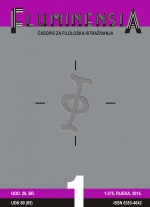“OH, MIO CARO FRATELLO DI LATTE” – PAOLO MAZZOLENI AND NICCOLÒ TOMMASEO
Keywords:
Niccolò Tommaseo, Paolo Mazzoleni, Zadar periodicals in the Italian languageAbstract
This paper analyses some of the contributions by Paolo Mazzoleni, one of Tommaseo’s most faithful followers in the literary, personal and political sense, published in periodicals in Zadar, in the Italian language, from 1899 to 1914. The analysed articles, found in the periodicals titled “Il Dalmata” and “La rivista dalmatica” and dedicated to the most prolific Dalmatian writer from the 19th century, are thematically classified and divided into two basic groups: biographical articles and articles dedicated to Tommaseo’s birth and death anniversaries. The common denominator of biographical articles is the illustration of Tommaseo’s character with a particular emphasis on his modesty, discretion, and on his contribution to the study of Italian literature and linguistics, on his love for his native Dalmatia and for all of its inhabitants notwithstanding their religion, nationality or language, and on his vision of religion and family and the role they should have within the society. On the other hand, the articles in honour of Tommaseo’s birth and death anniversaries represent a valuable source of information regarding the social, cultural and literary situation of that time. The articles also bear witness to the change of attitude towards Tommaseo which was conditioned first of all by the sudden political turmoil on the cultural and political scene in Dalmatia, starting with the dominant position of Italian culture and language in the last decade of the 19th century, through the raising of the Croatian national awareness at the beginning of the previous century, until the break out of the First World War and the role Italy and Dalmatian Italians had in it.
The basic goal of the above mentioned contributions is to keep the literary memory of the Dalmatian writer alive, to represent him as a cohesive element and a key figure in the 19th century Dalmatia, as well as to point to the negative effects on the region deriving from the abandonment of his postulates.

